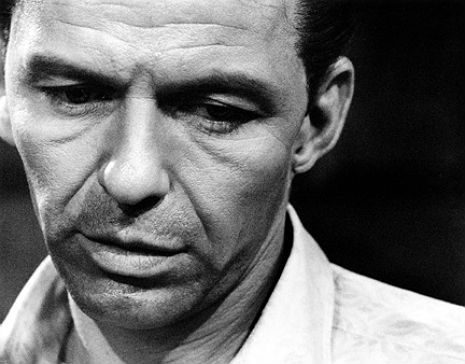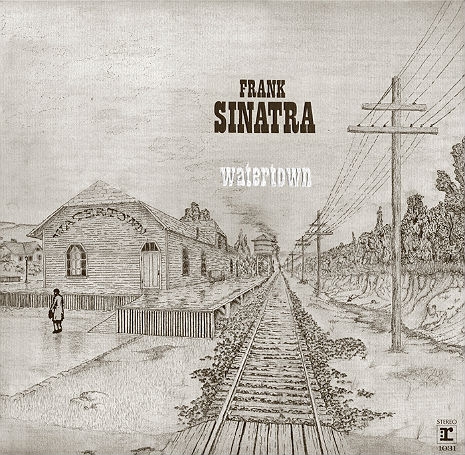
If ever there was a hidden masterpiece by a titanic musical artist of great multi-generational consequence that is virtually unknown to the general public, it’s Frank Sinatra’s heartbreaking 1970 concept album, Watertown. It’s one of the most gut-wrenching albums of all time, right up there with Lou Reed’s infamously depressing Berlin or Torment and Toreros by Marc Almond, another great soundtrack for slitting your wrists to. Watertown is every bit Sinatra’s Berlin, a bleak, bleak ravaged soul of an album that, in my interpretation at least (for there are several the narrative lends itself to), offers NO redemption at the end for the broken narrator.
Watertown‘s main composer was Bob Gaudio, who wrote hits like “Can’t Take My Eyes Off of You,” “Walk Like a Man,” and “Big Girls Don’t Cry” for his group The Four Seasons (Gaudio was an original “Jersey Boy.” When he was just 15 he wrote “Short Shorts” for the Royal Teens).
Gaudio’s first creative partner in Watertown was Jake Holmes, who wrote “Dazed and Confused” (read about that here), and later the US Army recruitment jingle “Be All That You Can Be” and the “Be a Pepper” song for Dr Pepper. Together they demo’d the songs and took it to Sinatra, who was looking for material that was more contemporary. He told them he wanted to do all of the songs, and in the same order.
Watertown‘s orchestral tracks were recorded in New York during July of 1969, a month before Sinatra added his vocals overdubs in Hollywood (the sole instance in his career when he recorded an album to prerecorded tracks). It was his deepest foray into “rock pop” territory.
Here’s a succinct description of Watertown via Wikipedia:
In a series of soliloquies, the nameless narrator tells his heartbreaking story of personal loss and unrealized redemption. His wife has left him and their two boys for the lure of the big city, and her absence hangs palpably in the air. While it is altogether understandable why someone would flee the stark and dreary landscape of Watertown, empathy rests with the eloquent everyman left behind. He is a desperate man, the personification of all that is pedestrian in a small town, a solitary figure who suffers unbearable torment and despair. But, in expressing timeless sentiments to a love that is hopelessly lost, he finds salvation in the written word and an extraordinary transformation takes place. In his grief, he achieves a deeper understanding of himself, and a transcendent awareness of what he has lost and why.
I’ll get back to that interpretation in a moment…
“Goodbye (She Quietly Says)” tees up the ball like a great novel would, when the narrator’s wife informs him that she is leaving him. The song is set in a coffee shop and the other customers do not notice what has taken place. No anger, just grief, quiet unbearable grief stoically absorbed amid the clatter of plates, coffee cups and the conversation of others.
The sparse, poetic power of the lyrics is as good as it gets. So much is implied here.
If that number didn’t turn on the waterworks, try Watertown‘s “Michael & Peter” on for size as Sinatra’s narrator transparently tries to manipulate his wife with a description in a letter, of how their sons have grown:
Michael is you, he has your face
he still has your eyes remember
Peter is me ‘cept when he smiles
And if you look at them both for a while
you can see they are you, they are me
This spring we had some heavy rain
by summer it was dry again
the roses that we planted last fall
climbed the wall
I think the house could use some paint
you know your mother’s such a saint
she takes the boys whenever she can
There’s a fantastic essay about Watertown at the Frankosonic blog that first turned me on to the album. I read this and was like “I have to hear this.. NOW.”
Upon first listen it’s the story of a man who has been deserted by his wife and left to bring up their two kids alone. Pretty much every song is addressed directly to the absent partner and the simplistic style of lyric reads like a series of letters. As the story develops, the Father receives news that she is coming back to them, but ultimately he’s left stranded at the Railway Station as it becomes apparent that she was never aboard the train and won’t ever return.
Admittedly I have listened to this album far too much and I started to think about the bits of the story that didn’t add up.
Firstly, she has not only abandoned him but also the two kids - I know this DOES happen but is not exactly common behavior among women. Secondly, he mentions that her Mother still comes by to help with the children and along with other friends they encourage him to move on and find a new love. Surely any mother would concentrate on getting her wayward daughter back on track and try to orchestrate a reconciliation? But he’s not ready to move on, he’s not over her and he can’t understand why nobody sees this. Lastly I just don’t get why she would say that she is coming back and then just not turn up, breaking his heart a second time. Then it dawned on me…
She’s not coming back because she’s dead.
This seems the most likely explanation to me, but Watertown is left open-ended. One thing seems incontrovertible about the ending and this is that she is never, ever returning to him. I don’t agree with the final line in the Wikipedia synopsis, not in the least. When “The Train” comes and goes without his wife on it, the image of Sinatra’s narrator standing in the rain on the platform, far from being a guy “finding a deeper understanding of himself, and a transcendent awareness of what he has lost and why” I see as an image of pure, unadulterated GRIEF and DESPAIR.
And maybe that grief has pushed him over the edge. Maybe all of the letters he wrote and never sent were written to a dead woman to begin with?
It’s interesting to note that this was the great Frank Sinatra seemingly coming in to lend his voice to what would appear to have been more Gaudio and Holmes’ project than his own (they wrote the material for him) but Sinatra’s vocal performance is so off-the-scale magnificent on Watertown, that it’s nearly impossible to imagine this material being sung by anyone else with the same unflinching depressing conviction that Sinatra does. I think it’s one of his greatest performances, ever.
It’s impossible to pick a “favorite” song from such a sad, sad song cycle, but “What’s Now Is Now” ranks with the very, very best of Sinatra’s material.
Watertown used to be nearly impossible to find. A CD could sell for $150 but you can get an import CD at Amazon. When I was looking for a good image of the cover, I noticed that there is a great new site totally devoted to this little-known, unsung masterpiece called Watertownology.






